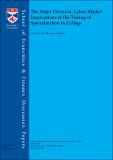The major decision : Labor market implications of the timing of specialization in college
Abstract
College students in the United States choose their major muchlater than their counterparts in Europe. American colleges also typically allow students to choose when they wish to make their major decision. In this paper we estimate the benefits of such a policy: specifically, whether additional years of multi-disciplinary education help students make a better choice of specialization, and at what cost in foregone specialized human capital. We first document that, in the cross section, students who choose their major later are more likely to change fields on the labor market. We then build and estimate a dynamic model of college education where the optimal timing of specialization reflects a tradeoff between discovering comparative advantage and acquiring occupation-specific skills. Multi-disciplinary education allows students to learn about their comparative advantage, while specialized education is more highly valued in occupations related to that field. Estimates suggest that delaying specialization is informative, although noisy. Working in the field of comparative advantage accounts for up to 20% of a well-matched worker’s earnings. While education is transferable across fields with only a 10% penalty, workers who wish to change fields incur a large, one-time cost. We then use these estimates to compare the current college system to one which imposes specialization at college entry. In this counterfactual, the number of workers who switch fields drops from 24% to 20%; however, the share of workers who are not working in the field of their comparative advantage rises substantially, from 23% to 30%. Overall, expected earnings fall by 1.5%.
Citation
Bridet , L & Leighton , M A 2015 ' The major decision : Labor market implications of the timing of specialization in college ' School of Economics & Finance Discussion Paper , no. 1510 , University of St Andrews , St Andrews , pp. 1-74 .
Publication
ISSN
0962-4031Type
Working or discussion paper
Collections
Items in the St Andrews Research Repository are protected by copyright, with all rights reserved, unless otherwise indicated.

